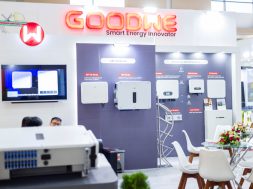
In a webinar conducted by EQ Magazine, opportunities in RE in the Union Budget 2022-23 discussed
The webinar on the 1st of February was conducted by EQ International Magazine on the topic “India Budget 2022 & Impact on India’s RE Sector.” It included discussion over the current scenario and future advancements of renewable energy, battery swapping, PIL from the Union Budget 2022-23, which was released on the 1st of February. The webinar was moderated by Dr. A. K. Jain, Vice Chairman, IDANZ & Director INA, Former MD REIL.
As in the union budget, 2022-23 finance minister Nirmala Sitharaman has announced to allocate Rs 19,500 crore to boost manufacturing of solar modules. The government first announced three schemes in March 2020, while 10 new PLI schemes were introduced in November 2020. In addition to this, Finance Minister said that India will issue sovereign green bonds for funding green infrastructure and a battery swapping policy and interoperability standards will be formulated soon.
What is in the Budget?
1. To support domestic manufacturing of solar panels for meeting the target of 280 GW of installed solar capacity by 2030, Rs 19,500 crore for Production Linked Incentive (PLI) for high-efficiency modules with priority to fully integrated units will be made in 2022-23.
2. A battery swapping policy will be launched to allow the setting up of charging stations at scale with private companies encouraged to model the swapping and land resources will be provided for the same.
3. Government will also promote a shift to the use of public transport in urban areas, which will be complemented by clean-tech and governance solutions, special mobility zones with zero fossil-fuel policy, and EV vehicles.
In the webinar, the panelists discussed the current situation of renewable energy along with its possibilities and future opportunities.
The budget emphasized the agenda of sustainable development and a carbon-free country. Overall, the focus was on clean energy, pesticide-free organic farming and electric mobility.
The moderator of the webinar Dr. A.K. Jain said that the budget has been very good in the terms of renewable energy which was first started in 2010 reviewed and revised in 2015, 2019 and 2021. The budget has a long-term vision not only for India but for the world the budget which is allocated for PLI is great.
On the increase in the basic customs duty (BCD) on import, Vineet Mittal Co-Founder and Director, Navitas Green Solutions Pvt LTD said that this decade is for manufacturing the equipment’s required for the renewable sector, focusing on building capacities for India and the globe, becoming a credible alternative to Chinese capacities. He also said that local capacities should be developed for long-term sustainable cash flow.
In the budget, the government emphasized renewable energy and employment. PLI scheme which is continuing in 14 Sector is going to bring a major change in India. It is being targeted to create 6 million jobs in the next 5 years.
Ritu Lal, Senior Vice President and Head of Institutional Relation, Amplus Solar was not surprised with the announcements which are made in the budget regarding renewable energy. She said, “It was very much aligned with expectations in terms of battery swapping and electric mobility. The budget has covered everything under the sun. If we want to meet a sustainability target then we need to work on these aspects. As an industry, we have always talked about storage, whether it is for renewable energy or electric mobility and the attention it needs on the national level. This budget will give long term visibility and stability to our industry.” She also appreciated the incentives which are allocated to the states and Sovereign Green Funds.
Syed Naqvi, Head, Module Technology, ACME Solar emphasized the increase of BCD and extension of PLI. He said, “The budget is in the favour of both, manufacturer and developer by promoting Make in India. Many big developers are planning to backward integration of the businesses. Also, BCD will discourage people from importing which is good news for the energy sector.”
The panelists agreed that the budget is sustainable progressive and inclusive. The projects which were delayed in the last 2 years because of Covid-19 will get some speed from now. Also, with increasing the capacity while the domestic demand is less, the government should focus on the countries which do not prefer Chinese imports.
Ravi Verma, Member, Governing Council, SPDA talked about the demand of RE said, “With the infrastructure, the GDP of the country will increase. PLI will increase the manufacturing capacity of high-efficiency modules, so the electricity consumption will increase and the demand for the renewable sector will increase.
“When the power demand will increase RE sector will boom.” He added.
The budget is growth-oriented and pro-development for 2022-23 by focusing on sustainable planning & development, energy transition for a cleaner tomorrow and inclusive growth. The special focus on clean mobility is laudable. The Battery Swapping policy and special EV mobility zones will help in the smooth transition to electric vehicles. The budget has laid the roadmap for long-term development over the next 25 years and areas like green energy and clean mobility systems. This budget commits to indigenous mobility solutions for a cleaner tomorrow.














